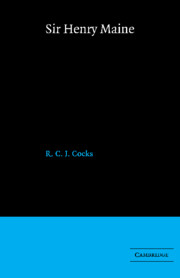2 - LAWYERS AND MAINE'S JURISPRUDENCE
Published online by Cambridge University Press: 29 September 2009
Summary
BEING A LAWYER
Modern jurisprudence is largely unconcerned with the problems which are of greatest importance to practitioners. For instance, in many countries the practising lawyers of the mid-twentieth century have been concerned with the question: if the law is to be effectively and fairly administered is it necessary to have a politically powerful and independent organisation of professional lawyers? Admittedly, academics have asked this question in some contexts; it is seen as being of obvious significance for a critical analysis of legal professions and the provision of legal services. But academics have not seen it as being primarily a jurisprudential issue which may be decided by, say, discovering some necessary quality of law or integrating historical facts about legal practice into legal philosophy.
For someone such as Maine, this modern approach would seem strange and inappropriate. In so far as jurisprudence was concerned with the study of ideas about law it was an odd view of the subject which excluded from consideration the ideas which were regarded as important by those who actually practised law. Maine himself wished very much to know the answer to questions such as: how did being a lawyer change the way in which a man thought about the law? What was it in progressive societies which could set off a reaction in legal thought which produced a preponderant role firstly for fictions, secondly for equity and thirdly for statutes?
- Type
- Chapter
- Information
- Sir Henry MaineA Study in Victorian Jurisprudence, pp. 39 - 51Publisher: Cambridge University PressPrint publication year: 1988



